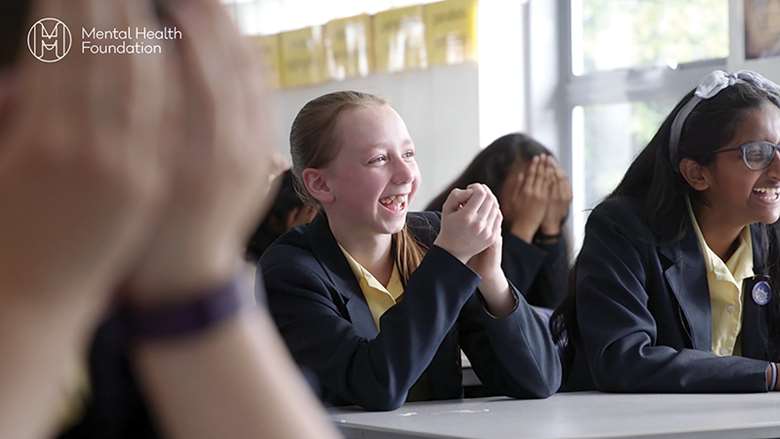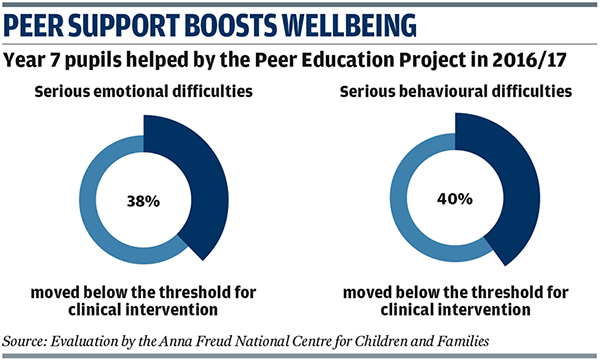How peer education improves mental health
Emily Rogers
Tuesday, November 28, 2017
Programme trains pupils to support their peers and better understand how to identify and tackle mental health challenges.

PROJECT
Mental Health Foundation Peer Education Project
PURPOSE
To equip secondary pupils with the skills and knowledge needed to stay mentally well, seek help when needed and support their peers
FUNDING
£97,000 in 2015 to 2017 and a £94,000 budget this year, supported by Friends of the Foundation and radio company Global's Make Some Noise campaign
BACKGROUND
The Mental Health Foundation was inspired to develop a peer education project by two teenage girls at Highgate School in London, who in 2015 supported each other and campaigned for better mental health awareness in schools. The charity worked with consultancy Cernis to co-produce a peer education syllabus and training plan with pupils from years 7 and 12 at the school.
Twenty peer educators delivered the programme to 300 year 7 pupils across three schools in 2015/16, expanding to 100 peer educators and nearly 1,000 younger pupils across seven schools in London and the South in 2016/17.
ACTION
Schools recruit two year 12 peer educators per year 7 class plus several extra as cover - between 10 and 16 per school. Their two-day training has so far been delivered by Mental Health Foundation staff and partners, who now plan to train teachers to deliver it themselves. New recruits are introduced to the syllabus's content and concepts, then practise delivering it to their peers.
Peer educators work in pairs to deliver five interactive sessions of around an hour, based on discussion and games. In the first session, the younger pupils explore what is meant by mental health while session two is about busting myths that can contribute to stigma and discrimination.
The final three sessions guide pupils through the steps needed to maintain good mental health and day-to-day wellbeing, including how to help themselves, seek extra help and support their friends. "We show them how people with mental health problems might behave and how they might be feeling, using real case studies," explains project manager Helen Bohan. "We ask them to consider what might make that situation better or worse."
A teacher remains in the room to help with classroom management, but is encouraged to allow peer educators to take the lead.
"The primary thing peer educators bring is authenticity, which young people really seem to value," says Bohan. "Staff say year 12 pupils' experiences are so recent and relevant that year 7 pupils really take them on board. They appreciate that these pupils have faced the same challenges they will.
"Teachers have said this builds relationships that wouldn't otherwise exist between older and younger students, who can remind each other that it is okay to talk about mental health in school."
The Mental Health Foundation plans to expand the project across the UK, particularly in deprived areas. It also plans to help partner schools tailor it for pupils with learning disabilities.
OUTCOME
An independent evaluation was conducted by the Anna Freud National Centre for Children and Families, based on before and after questionnaires completed by 455 year 7 pupils and 45 peer educators across seven schools in 2016/17. It shows a statistically significant reduction in emotional health problems among the younger pupils. Of those with pre-programme scores above the clinical threshold for emotional difficulties, 38 per cent moved below that threshold afterwards, with 40 per cent moving below the threshold for behavioural difficulties.
Half of year 7 pupils showed improved knowledge of what stigma is, 28 per cent had increased knowledge of discrimination, and 13 per cent showed improved knowledge about mental health and mental illness. In addition, 21 per cent said they were better able to talk openly about their mental health and the same percentage reported more confidence in helping friends. Meanwhile 22 per cent said they were more knowledgeable about how to keep well and 27 per cent of peer educators reported better knowledge of when to ask for help.

If you think your project is worthy of inclusion, email supporting data to derren.hayes@markallengroup.com




